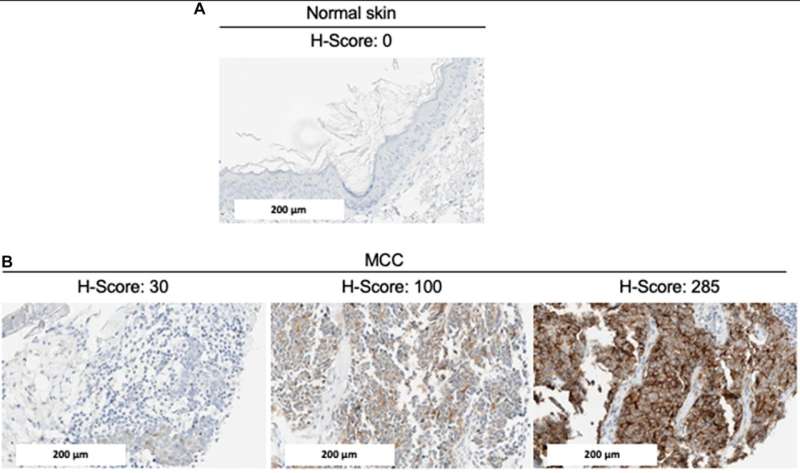Glypican-3 (GPC3) is associated with MCPyV-negative status and impaired outcome in Merkel cell carcinoma

A new research paper was published in Oncotarget on August 3, 2022, entitled, "Glypican-3 (GPC3) is associated with MCPyV-negative status and impaired outcome in Merkel cell carcinoma."
Merkel cell carcinoma (MCC) is an aggressive skin cancer, related to the Merkel Cell Polyomavirus (MCPyV) in 80% of cases. Immune checkpoint inhibitors provide sustained benefit in about 50% of MCC patients with advanced disease.
Glypican-3 (GPC3) is an oncofetal tumor antigen that is an attractive target for chimeric antigen receptor T cell therapy due to its highly restricted expression on normal tissue and high prevalence in several solid tumors. GPC3 is known to be expressed in MCC but its association with tumor characteristics or prognosis has not been reported.
In this study, researchers (Sujatha Muralidharan, Thibault Kervarrec, Glen J. Weiss, and Mahtab Samimi) from SOTIO Biotech Inc. and the University Hospital of Tours investigated MCC GPC3 expression by immunohistochemistry (IHC) and its association with tumor characteristics, MCPyV status and patient outcome.
"The aim of the present study was to complete validation of a GPC3 antibody for use in immunohistochemistry (IHC), investigate the expression of GPC3 in MCC by IHC and to assess its association with tumor characteristics, MCPyV status, and patient outcome," say the researchers.
The GC33 antibody clone was validated for GPC3 IHC staining of tumor specimens in comparison to an established GPC3 IHC antibody. An MCC tissue microarray was stained for GPC3 by IHC using GC33 antibody. Association of GPC3+ IHC with baseline characteristics, MCPyV status (qPCR) and outcome (death from MCC/recurrence) were assessed.
Forty-two of 62 samples (67.7%) were GPC3+. GPC3 expression was more frequently observed in females (p = 0.048) and MCPyV-negative tumors (p = 0.021). By multivariate analysis, GPC3 expression was associated with increased death from disease (CSS) (hazard ratio [HR] 4.05, 95% CI 1.06–15.43), together with advanced age (HR 4.85, 95% CI 1.39–16.9) and male gender (HR 4.64, 95% CI 1.31–16.41).
GPC3 expression is frequent in MCC tumors, especially MCPyV-negative cases, and is associated with increased risk of death. High prevalence of surface GPC3 makes it a putative drug target.
"In this study, we found that GPC3 was expressed in nearly 70% of MCC tumors and up to 90% of MCPyV-negative cases, and was associated with worse prognosis in terms of risk of death from MCC," state the researchers.
More information: Sujatha Muralidharan et al, Glypican-3 (GPC3) is associated with MCPyV-negative status and impaired outcome in Merkel cell carcinoma, Oncotarget (2022). DOI: 10.18632/oncotarget.28260



















